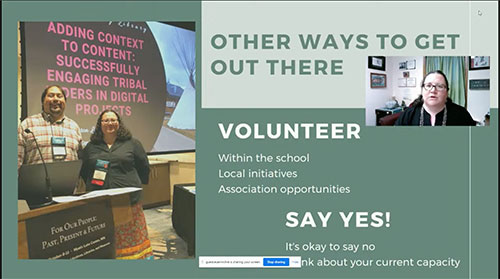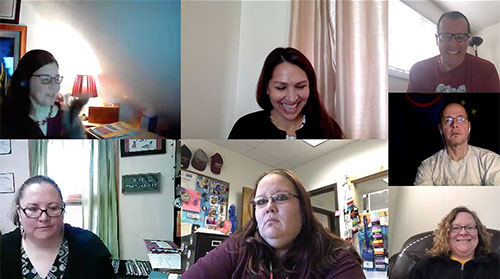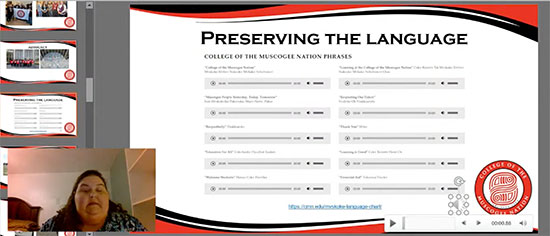Grant Spotlight | December 16, 2021
Share ThisDecember 16, 2021

“We wanted to prepare future school librarians to be leaders in their communities and advocates for inclusive practices, particularly those in areas serving predominantly Indigenous populations.” —Deborah Rinio, MLS, PhD, Assistant Teaching Professor and Program Director, Library Media Certificate Program, Montana State University
Despite it being thousands of miles away, Montana State University’s (MSU) Library Media Certificate (LMC) program has always had a large percentage of students from Alaska. Over time, the staff realized a need for the master’s level curriculum to reflect the diverse experiences of these learners and the communities they serve.
Deborah Rinio, MLS, PhD, Assistant Teaching Professor and Program Director of the Library Media Certificate Program at MSU works as the principal investigator on the project. She also lives in Alaska.
“Dr. Ann Ewbank, the former LMC program director, and I envisioned the project several years ago as a way to meet the needs of our students and bring a much-needed cultural lens to the work we do as school librarians and educators,” Rinio explained.

Getting Perspective
Thanks to funding from the Laura Bush 21st Century Librarian Program at the Institute for Museum and Library Services, MSU created the Indigenous Perspective in School Librarianship (IPSL) project to prepare future school librarians to be culturally relevant educators who can serve as models and leaders in their schools and communities.
The open access curriculum continues to meet national Library Media Specialist Preparation Standards and includes a cohort-based model with opportunities to address issues of concern, discuss relevant opportunities and challenges in schools, and work with experts.
After completing the program, learners will be able to better contribute to the well-being of their school communities. In addition, other school librarian preparation programs will have access to the curriculum so that they can adapt their programs, too.
In addition to the redesign of the MSU LMC program curriculum to include Indigenous perspectives, the project also set out to recruit and train 30 teachers in Alaska and Montana to become school librarians.
Finding the Right Fit
Rinio said working with students is the best part of any project, and this one is no exception. The first IPSL cohort of students began the program in Fall 2021. Passionate and dedicated professionals, they are eager to meet the National School Library Standards, the Montana Indian Education for All standards, and the Alaska Standards for Culturally Relevant Educators.
Rinio and her project team are also working with project consultants—an Indigenous education specialist and an instructional designer—to help redesign the courses to meet standards and project goals, as well as become more reflective practitioners.
“It’s been a wonderful experience. They help us not only to improve our courses for the immediate cohort of students, but also to make the courses accessible so that we can share our finalized curriculum with other LMC programs nationwide,” Rinio said.
However, every project has its pain points. For IPSL, staffing and time management has been a challenge due to a transition in team members mid-way through the project. Still, Rinio is optimistic.
“Redesigning a curriculum, implementing it, and revising it takes time. So did finding staff that we could build relationships and organizational structures with,” she said. “That pushed our timeline back. Luckily, our current staff is amazing, and the iterative nature of the process means that we will have additional opportunities to review our materials and outcomes.”

Next Steps in the New Year
After the curriculum is redesigned, it will be posted to ScholarWorks so that library faculty at other institutions can access it and adapt it for use with their own learners. The IPSL project team plans to add explanatory text and videos to make the information as useful as possible.
“But the curriculum is never truly finalized,” Rinio added. “We will always continue to make modifications to reflect our changing society, learners, and educational landscape, as well as to integrate newer resources.”
The team will be recruiting educators in Montana and Alaska for the second cohort of the project starting in January 2022.
About the Project
Grant Project Name: Indigenous Perspective in School Librarianship
Grant Log Number: RE-246303-OLS-20
Year Awarded: 2020
Recipient: Montana State University
Project Contact:
Deborah Rinio, MLS, PhD
Assistant Teaching Professor and Program Director
Library Media Certificate Program
Montana State University
deborah.rinio@montana.edu
Website: https://www.montana.edu/education/grad/librarymedia/ipsl.html
